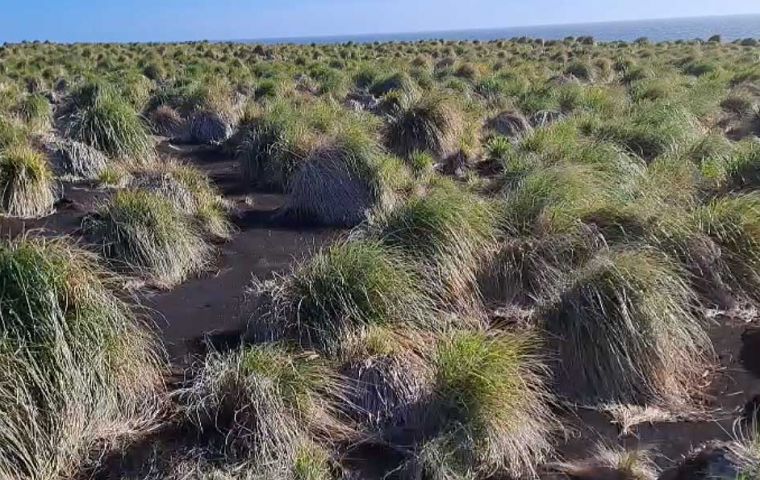MercoPress. South Atlantic News Agency
Falklands agriculture, grants for the Land Recovery Program
 Some of the eroded shore line in islands of the archipelago recovered with Tussock grass tufts
Some of the eroded shore line in islands of the archipelago recovered with Tussock grass tufts The Falkland Islands Government (FIG) Department of Agriculture has launched a new Land Recovery Program (LRP), inviting proposals for applied research and demonstration projects that will help restore and protect the Islands’ farmland.
The LRP is designed to tackle degraded land, strengthen the resilience of farm systems, and enhance biodiversity, all while supporting productive agriculture.
Grants of up to £30,000 are available for projects running up to 24 months, with funding expected for two to three projects this year.
Projects must bring together farmers and research partners to test practical, field-based approaches that deliver real benefits to the land, to agriculture, and to local communities.
Priority areas include:
- Water and soil management –such as ditch-blocking, erosion control, and soil stabilization.
- Vegetation and habitat restoration – including revegetation, native shrub and tree planting.
- Sustainable grazing and stock management – strategies such as livestock movement, grazingresting cycles, and recovery of native plants.
- Land condition monitoring –developing indicators of recovery and trialing new tools like drones and virtual fencing.
All projects must involve direct farmer participation, practical trials, cost-benefit analysis, and outreach to share results with the wider farming community.
“At Last,” the heartening announcement
The Falklands weekly Penguin News said in its latest editorial that it was genuinely heartening to see the press release announcing grants of up to £30,000 for applied research and demonstration projects under the new Land Recovery Program.
At last, the Falklands is properly entering into the global conversation on land recovery.
One of my favourite non Falklands story of land recovery well ‘pond recovery’ to be entirely accurate are the so-called “zombie ponds” in Essex. Farmers there found that forgotten old ponds, left to silt up and vanish, could be revived with little more than a digger and a bit of patience. Suddenly the fields were buzzing with dragonflies and newts again, and other farms quickly copied the idea. It’s not flashy, it’s not billion-dollar carbon trading, but it works. There’s something appealing about that sort of down-to-earth recovery, and it’s reminds me of the kind of spirit that emanates from many of our own farmers.
That’s the real promise of the Falklands scheme: not grand gestures, but modest, clever interventions that show results people can see with their own eyes. If even a handful of projects prove that healthier land can mean healthier farms too, then this initiative will more than earn its keep. We may be latecomers, but we’ve got the advantage of learning from what’s already succeeded elsewhere -and shaping a Falklands-made approach to looking after the land that looks after us.
Burning Permits
The Falklands Department of Agriculture has informed that Permits are required for anyone burning land after September 15th 2025. Please apply in writing to the Department of Agriculture (email: kstephenson@naturalresources.gov.fk) giving details and a map of the area to be burnt at least 48 hours prior to wanting to carry out the burn.
Please note that grass fires or ‘camp burns’ will only be permitted on wet white grass flats on weekdays during September and no permits will be issued for ‘camp’ burns after 30th September due to environmental impact.
Permits will continue to be issued for the burning of trash on cultivated areas of ground.
Please ensure the guidelines available from the DoA are followed.




Top Comments
Disclaimer & comment rulesCommenting for this story is now closed.
If you have a Facebook account, become a fan and comment on our Facebook Page!